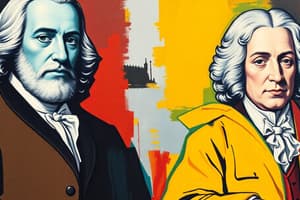Podcast
Questions and Answers
What was Thomas Hobbes' State of Nature?
What was Thomas Hobbes' State of Nature?
Humans were brutish, and we would only fight to get what we wanted. No one would create anything new or original and we all had the same rights to everything.
What is John Locke's State of Nature?
What is John Locke's State of Nature?
Humans start from a blank slate, or tabula rasa, and can be programmed. Governments should give people their natural rights. The three natural rights are Life, Liberty, and Property.
What was Thomas Hobbes' Social Contract?
What was Thomas Hobbes' Social Contract?
People should give up rights for protection. Once people gave up their power, they lost the right to question government.
What was John Locke's Social Contract?
What was John Locke's Social Contract?
What was Thomas Hobbes' view on government?
What was Thomas Hobbes' view on government?
What was John Locke's view on government?
What was John Locke's view on government?
What is anarchy?
What is anarchy?
What is oligarchy?
What is oligarchy?
What is a democracy?
What is a democracy?
What is monarchy?
What is monarchy?
Study Notes
Thomas Hobbes
- Hobbes described the State of Nature as a brutish existence where individuals fought to satisfy their desires.
- In Hobbes' view, the State of Nature lacked creativity and equality, with everyone claiming the same rights to all resources.
- The Social Contract, according to Hobbes, requires individuals to surrender certain rights in exchange for governmental protection.
- Once individuals relinquish their power to the government, they lose the right to question its authority.
- Hobbes favored a monarchy where power is concentrated in a single, unchanging ruler.
John Locke
- Locke's concept of the State of Nature revolves around the idea of a "tabula rasa," suggesting humans can be shaped by experiences.
- He argued that governments should protect the natural rights of individuals, which are Life, Liberty, and Property.
- Locke's Social Contract is a reciprocal arrangement where the government and citizens have mutual obligations.
- He advocated for a democratic government that relies on the consent of the governed to function effectively.
Forms of Government
- Anarchy refers to the complete absence of government and law.
- Oligarchy is the rule by a small group of individuals or families.
- Democracy involves citizens electing their leaders through a voting process.
- Monarchy is characterized by a single ruling individual, often inheriting power.
Studying That Suits You
Use AI to generate personalized quizzes and flashcards to suit your learning preferences.
Description
Explore the contrasting views of Thomas Hobbes and John Locke on the state of nature and the role of government. Understand Hobbes' notion of a brutish existence versus Locke's belief in natural rights and self-governance. This quiz will test your knowledge of these foundational political theories.




